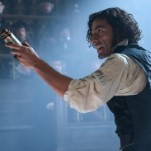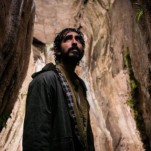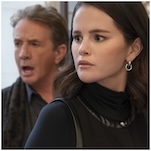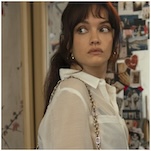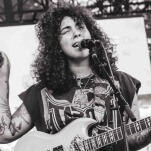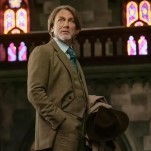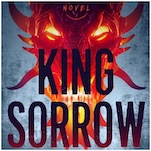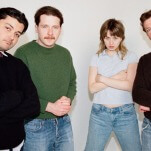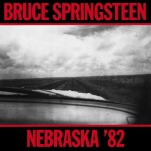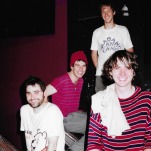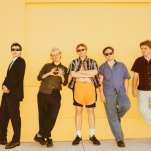To celebrate the anniversary, I gathered nine other writer friends of mine and asked them to write a short story inspired by one of the songs from Turn on the Bright Lights. The results were predictably goofy, melancholy, lonely, horny, ruminative and passionate. Ten stories for 10 songs on the 10th year the record has existed in our consciousness, (we combined “Obstacle 1” and “Obstacle 2” simply for aesthetical congruency). In some ways interpretive fiction is the only way to talk about these soul-searching songs. I hope you enjoy.—Luke Winkie
It’s an important decision, choosing the tie in which you’re going to murder someone.
On the dresser, he places the ties next to each other, four of them, side by side by side by side. He observes not so much their own colors or patterns, but the way those colors and patterns interact with his suit, with him. Each tie is considered, held up to his neck in front of the elaborate Victorian mirror and judged according to how successful each will allow him to be.
It’s important that they appear mildly inexpensive, which is why his suit is not immaculately pressed and his collar a bit asymmetrical. He, himself, is not inordinately good-looking, no Patrick Bateman certainly, and he knows that he will be no woman’s first nor second choice tonight. Instead, he’ll watch as his choices narrow themselves down, become progressively more alone, progressively more desperate to make some—any—connection.
The watching and waiting, that’s the most exciting part. It’s not so much thinning the herd so much as the herd thinning itself for him; the sick and the weak killing themselves off while the jackal licks its lips.
He must play the personable, approachable alternative. The one who listens and responds in kind. The one who does not demand to spend the night together, but asks sheepishly if she would like to have another drink at his place. Cufflinks, of course, are out.
The cut of his suit is slightly off, like he’s simultaneously too big and too small for it. It’s a subtle thing; he doesn’t look shabby, just slightly off in a way that anyone else wouldn’t be able to put a finger on, but it lends him a sense of innocence that tastes sweeter in that moment, the moment when the woman realizes. Her pupils narrow and her skin suddenly goes cold, goose bumps cascade down her bare arms in a wave.
Usually this is when he ties one of his more expensive ties—Dolce & Gabbana, Gucci, Louis Vuitton—around her wrists.
Aimlessly he stares into his watch drawer and wonders idly about the ways in which the woman he will meet tonight will resemble and differ from all the women he’s brought home in the past. The cut of her dress or skirt will likely be too short by no more or less than an inch, her perfume just a hair too sweet and heavy. The shade of her lipstick will be too aggressive.
He’ll fall in love with her then, just for a moment. Or at least he’ll fall in love simultaneously with the desperation and anticipation, the way that the two of them are orbiting around the inevitable of discovering each other, how she is spilling down the spiral staircase of the social failures of a night out and how he is stalking her with claws retracted and teeth straightened.
He’s always invisible at first, with his imperfectly coiffed hair, his overly large nose, his unremarkable height. From his closet he chooses a pair of shoes with wear, in a shade of black that in the dark will appear to match the black of his slacks but in the light will clash.
The women he chooses, or rather the ones who choose him, are the ones who never would have in his youth. They are the ones he was in awe of, the way their long and slender legs pushed them across floors in an effortless glide. As they spin toward him on these nights, their glide now hiccups, and their grace stumbles with it.
The tumbler of scotch on his dresser refracts the light from his chandelier, casting rainbows filtered through amber on the rich oak grain. He runs his fingers around the edge of the glass and feels nothing; the nerves in his fingertips have long since been deadened by the pressure of a thousand strangulations.
The strangulation is the climax of the situation, but he almost prefers the buildup. He finds something remarkable in seeing them tied up, seated in one of his hand-crafted pre-Civil War era pine wood chairs, their makeup dripping down their cheekbones, following the path carved by their tears. As he straddles their legs, his face impassive, he takes in the haphazard, accidental beauty of their flushed faces. When he reaches out with his large, calloused hands toward their throat, their breath always hitches, like a prelude. As the pressure builds, their eyes bulge and their tongues try to force their way out of their mouths, and the sounds follow an established, well-practiced pattern, like the Liszt sonatas he practices on his Steinway grand.
A large, ornate grandfather clock strikes nine in the evening in crisp, solid tones that recall the crystal tenor of Andrea Bocelli. He closes his eyes and listens to the rich harmonics of the bells ringing in unison, conducting them with his left hand automatically as his right fingers the ties that lay on his dresser one last time.
As the ninth bell tolls, his eyes snap open, decisive. He picks a tie from his dresser and with a few swift, authoritative motions, finishes the knot and brings it to his neck. With finality and a faint smile, he turns toward the door, but takes one last sidelong glance into the mirror.
The tie he chooses is a deep, violent blood red.
And then he is gone into the city, nameless and invisible.
“Stella Was A Diver and She Was Always Down” by Nick Sylvester
A few days after Sept. 11, I got a call from Zinc Burkles at Matador about doing some work for that band Interpol. I was doing a lot of product design back then, specifically in the space between indie rock and indie sex, which at the time was still called “college sex.” Indie sex toys, basically. I wasn’t exactly balls deep in the game yet, but I had done a few one-offs and the future looked promising.
“Big opportunity,” Zinc said. “Enormous opportunity. Large Professor big. Zongamin big. Demolition Doll Rods big.”
I told Zinc I couldn’t take on any new projects. For one, I was finishing up a toy for Lali Puna. It was a big year for “lap-pop”; if your laptop had ports, I was trying my best to make sure you could stick your dick in them. I was also working on a tie-in for that new Unwound record: a spinning penis sheath made of real foliage, such that leaves actually turned inside you.
Interpol were upstate knocking out their record, he said. He assured me they were a very studious band who abstained from drugs and all forms of womanizing. The band had a song called “Stella.” The opportunity—the money shot (Zinc’s words)—came at the end of the song:
“Well/She was my pentatonic sex toy, love-joy diver”
You have to remember, there weren’t many people in the indie sex toy game at this point. This was pre-Fucktunes. Pre-Bonerfy. This was a time when lying on your back and stacking 45s using your dick as a spindle was not just a “hip DIY thing” to do. It was just how people lived.
The ask was clear enough. Matador wanted a sex toy that incorporated the pentatonic scale. If I could work in a watersports angle (“love-joy diver”), even better, Zinc said.
I don’t do watersports toys. To me, urine is best left pure. Peeing on another human being makes perfect sense to me. But when you introduce toys, that’s when I start feeling like a pervert. I’m sorry, I told Zinc. I’m just not interested.
Then he made me an offer I couldn’t refuse.
“If you do this,” Zinc said, “I’ll make sure you’re the first person we send the new Pretty Girls Make Graves promo.”
I assembled a team. Audio engineers for prototyping. Electrical engineers for building. A creative technologist for attending team-building conferences on the company dime and otherwise contributing no value to the project.
This is how the pentatonic sex toy, code name Stella, would work. The pentatonic scale is your standard do-re-mi type scale but without the semitones. No “fa,” no “ti.” Getting rid of those means no dissonance or devil chords; you can hit any one note after the other and it will never sound like you’re making a mistake.
The no mistakes/improvision aspect resonated with the team, from a sex angle. The toy had to be improvisational—no wrong way to use it. Put another way, a true pentatonic sex toy needed to fill every hole.
We were past the physical, in the domain of the metaphysical, approaching the supernatural, by means of the anal. Every anus has a resonant frequency. Some people say anuses are a state of mind; others say people don’t have them at all. There are ears—the reverse-anuses of the brain—and there is the skin, which is a kind of anus crowdsourcing. Stella was a diver and she was always down. For what?
It didn’t get much further than that. The lead singer had turned in his lyrics sheets for publishing; it was “catatonic sex toy,” not “pentatonic.” Maybe some of our research and design work could hold up but now there was no wiggling out of that watersports requirement. Zinc was clear about that one and—I have no idea who ended up getting the commission but am glad to hear the band is doing well.
“Roland” by Drew Millard
Michael Jordan sat at the the VIP Section of Jay-Z’s 40/40 club with his best friend Charles Oakley. Nobody was allowed to smoke in the club but they got to anyway because they were Michael Jordan and his best friend Charles Oakley. Michael Jordan had texted Jay-Z to come hang out with him but he hadn’t responded. Michael Jordan wondered where he’d left his hoop earring. He nervously fingered the collar on his mock neck blazer. It was tan and big, just how Mike liked it. Charles Oakley was drumming on the sparkly table with his fingers. They were drinking fancy champagne because they were members of the NBA Hall Of Fame. David Stern could suck Michael Jordan’s dick.
Loud rap music was playing. Michael Jordan didn’t really like loud music very much, but he liked the 40/40 Club. He and Charles Oakley had flown there to hang out with Jay-Z but he wasn’t returning Michael Jordan’s text messages. Michael Jordan thought about texting Dennis Rodman and having him text Jay-Z to see if Jay-Z was ignoring his text messages but he didn’t want to seem weird. Instead, Michael Jordan just drank more fancy champagne. Michael Jordan was confident. Michael Jordan was an NBA Hall Of Famer. David Stern could suck Michael Jordan’s dick.
If Michael Jordan had been on the other side of the club and also had laser vision to see through the cigar smoke he could have seen all of the bright lights shimmer as they reflected off of Charles Oakley’s beard because he kept grinding his jaw. But he wasn’t across the club, he was sitting next to him. “Play it cool, Charles Oakley,” Michael Jordan said to Charles Oakley. “Sorry Michael Jordan,” Charles Oakley said to Michael Jordan. The two NBA Hall Of Famers took a moment to stare at women in the VIP lounge of the 40/40 club. Though they weren’t telepathic, both Michael Jordan and Charles Oakley were each thinking about finding someone to suck their dicks.
“I don’t know if I’ll ever find a girl who likes me, Charles Oakley,” Michael Jordan said to Charles Oakley. “I like you, Michael Jordan,” Charles Oakley said to Michael Jordan. But Charles Oakley wasn’t a girl, he was Charles Oakley. Michael Jordan reached his hand across the table and tapped Charles Oakley on the wrist. Charles Oakley reached into the interior left breast pocket of his suit with his right hand and pulled out a small vial of cocaine and put it in Michael Jordan’s hand. Michael Jordan reached into the left side pocket of his pants and pulled out his keys, opening the vial of cocaine with his right hand as he brought both the key and vial up to his nose. Michael Jordan was digging around the vial of cocaine with his key trying to get the exact right amount of cocaine to snort when two large men in black suits and sunglasses came up to him and Charles Oakley. “What are you doing with that cocaine,” they said to Michael Jordan and Charles Oakley. Michael Jordan snorted the cocaine and said, “I’m Michael Jordan and this is Charles Oakley. You can suck our dicks.”
The two men in black suits and sunglasses looked at each other and then at Michael Jordan and Charles Oakley. “We’re not sucking anybody’s dicks,” they said to Michael Jordan and Charles Oakley. “You have to leave.”
Michael Jordan felt sad. Jay-Z wouldn’t have let this happen. But Jay-Z still hadn’t texted him back. Michael Jordan began to cry a little. So did Charles Oakley. Michael Jordan handed the large men in black suits and sunglasses the rest of his cocaine and he and Charles Oakley got up to leave. “Come on Charles Oakley,” Michael Jordan said as he found his hand sliding into Charles Oakley’s. “Let’s go home.”
“The New” by Stephen Slaybaugh
He was bundled up real well, but he could still feel the sting of the cold air on the few inches of his face that were exposed between his scarf and the brim of his stocking cap. T.S. Eliot certainly had never experienced Milwaukee in February when he claimed April to be the cruelest month, never experienced a wasteland like the tundra the Wisconsin city became when the winds of Canada whipped down across the icy Lake Michigan. Sam trudged down his driveway, straddling the line where cement met grass and enjoying the crunch of the frozen turf each time his right foot made contact. As he made his way to his bus stop at the bottom of the slight slope that led to his house, he shoved his hands into his pockets even though they were Thinsulated in a pair of gloves. In his right pocket, he found a heart-shaped chocolate wrapped in shiny red foil, a remnant of the day before. After gazing down at it for a moment and emitting the slightest of sighs, he put the candy back in his coat pocket and waited for his bus.
It wasn’t long before Sam’s bus arrived, and the driver smiled at him in recognition as he boarded the vehicle. Sam found a seat, and knowing the length of his ride, he removed his hat and gloves. He turned to gaze out the window. The glass was fogged, so he wrote his name, smiling at this simple pleasure. He peered out the window through the three letters of his name, watching S-shaped cutouts of trees and A-shaped segments of buildings pass by for a few blocks before wiping away his name and clearing the entirety of the small frame. With the full panorama of Lake Bluff Boulevard now visible, he removed the chocolate from his coat again, peeled back its wrapper, and popped it into his mouth. Cold at first, the chocolate soon warmed to the inside of his mouth, its mixture of bitter and sweet flavors growing stronger as it melted on his tongue.
As the chocolate trickled down his throat, he thought back to what she had told him yesterday. He had run into her at lunch and given her a card that he had carefully selected and a small box containing half a dozen candies like the one he was eating. She opened the envelope, read the card’s front and inside, then placed it back in its envelope. “I can’t pretend that I like you” she said, putting the gifts back in his hands before returning to the conversation she had been having with the two friends who had been staring at him with a combination of confusion and contempt. Her words had felt like a punch to the gut, knocking the wind out of him along with his confidence. Sitting in his bus seat, Sam winced at the memory and swallowed the rest of the chocolate. He made a vague promise to himself that he wouldn’t put himself in such a compromising position again, even if it meant spending the rest of his life alone.
The bus arrived at its last stop and Sam rose with the rest of the passengers to disembark. As he waited to exit the bus, he put his hat back on, pulling it down as low it would go without covering his eyes. He knew there was a good chance that he might see her, and he wanted to be as unrecognizable as possible. He remembered when he had first spied her last year. She stood out amongst the rest of his colleagues, her curly blond tresses shining radiantly like a beacon to him. In the subsequent months, their paths crossed with increasing frequency, or at least that’s the way it seemed to him. He would see her walking in the hall nearly every day, and he was surprised he hadn’t noticed her before. For months, he had tried to work up the courage to introduce himself, but the ideal opportunity never seemed to present himself. He had finally settled on a date, Feb. 14, to make his move, and now as he filled with dread at the prospect of spying her in that same hallway, he wished he never had approached her.
Sam walked down the wide hall, trying to keep his eyes glued to the orange carpeted floor in front of him while at the same catch a glimpse of his one-time object of affection. He had almost made it to his destination, and feeling a degree of safety, lifted his head only to meet her gaze boring into him. As he darted away, he thought he heard a slight giggle, and the sound shot through him on a wave of panic.
Sam quickly removed his coat, gloves, hat and scarf and sat down at his desk. He wiped away the tears sticking to his cheek and tried to convince himself that they were only from the physical exertion of running and not signs of any emotional trauma. He tried to erase the image of her face from his mind, but he couldn’t stop picturing her stare. “I need to defend some part of me,” he started to think, but the thought was interrupted by Mrs. Banks. “Settle down children,” the kindergarten teacher said as she began to take attendance.
“Leif Erikson” by Paula Mejia
The letter arrives on a Wednesday afternoon. Expedited delivery stamp, no return address.
I tear at the envelope’s edges. Inside lies an obituary neatly pinned to the corner of a memorial service that had taken place three days prior. Running my finger over the smart Georgia typeface, my mind only registers the pulpy bits, like “dashing,” “bright” and “drowned.” On print, the news doesn’t feel immediate.
Judging from the looping Cs curling into hissing Hs scripted onto the envelope, the clippings were sent by a she. A predatory she from the past testing the strings I’ve cut, gauging my long-distance reaction to Eric’s death. We hadn’t spoken in close to two years.
The real question is, who managed to get a hold of my address? Maybe this is some kind of a morbid joke from six time zones and an ocean away. A mere month after leaving I’m already being pulled back to places I swore I wouldn’t return.
Dusk descends rapidly as I instinctively make my way toward Norrebo. I peer across the bridge separating the city into two halves. My reflection warps itself through the film of ice sheets below, and for a moment I see Eric’s form buried six feet under the watery enclave. If I want to know the fine details, I can call one of the three numbers I still know by heart. That’s the funny thing about estrangement—you’re still always chained to something, usually the denial that wrought you out in the first place.
A mere seven hours of stale sunlight punctures sky during winter. The only glow emanates from paper-thin souls humming through cobblestoned streets, like lucid Chinese lanterns. I walk and walk, trudging against the wind, unsure what I’m drifting towards. Eventually the lights fade and the disorienting Nordic blackness drapes me whole. Unsatisfied, I turn around and start the long walk back.
For the next three days I set my clock for nine but stir around eight o’clock, restless. Guilt grips me closely through the nights, attempting to shake out a human response in the place of numbness. On Saturday I rise deliberately, physically forcing thoughts of Eric from my mind. Today I’ll be the wanderer. Perhaps I’ll even blurt out a “tak for alt” in conversation. That’s what you’re supposed to do when you move to a new country: make an effort to learn the language.
Without friends I retreat to the comfort of Paludan’s mahogany bookshelves, planning to disappear into any kind of stack. In fragmented Danish, I ask for a latte. The unbearably handsome barista, cheekbones raised toward the heavens, replies in a practiced English.
“You’re American?”
“That’s right.”
“What brings you to Copenhagen?”
I blink, never having had to answer the question for anyone except myself.
“I’m not sure. I needed to go somewhere completely unfamiliar.”
He nods. “So you chose Denmark over somewhere tropical and warm?”
“I suppose,” is my half-baked reply. The disarmingly pleasant expression on his face, like that of most Danes, makes it impossible to tell his exact age.
“I hear that this is the happiest country in the world, though. Why is that?”
He’s pensive for a while before answering. “I don’t think it’s so much that we’re happy, it’s just that we don’t expect a lot. If your expectations aren’t high, you can’t be disappointed.”
“That’s a good philosophy. Maybe it’s time I learn from your ways,” I laugh in spite of myself, the corners of my mouth curling into a smile.
The latte materializes before me. I hadn’t even seen him make it. He watches me as I run my finger over the rim.
“I’m Frederick,” he says, extending a hand.
“Leah.”
Later that night Frederick throws me onto his bed and I marvel at the curious softness of skin wrapped around muscles. Bare, my own back muscles are tense, like piano strings. I trace his spine with kid gloves, my nails occasionally digging in as I count the bones. Twelve, 13, 14. The clock on the wall keeps time, either measuring each prolongated thrust in seconds or counting down as my petals are steadily plucked one by one. I can’t tell. Eventually we both collapse into his bed.
For the first time in days sleep descends on me heavily. I dream of my big brother Eric swinging me in the air. The two of us twirl barefoot in a vineland not unlike Napa. “I’m sorry, I’m sorry,” I keep whispering to him in a demented sing-song. He doesn’t say anything but extends his arms as if to say, “come here to me.”
I wake up shuddering. Frederick’s gray eyes flutter open, adjusting to my own retinas. I notice for the first time how delicate and long his eyelashes are. He pulls me close into his chest.
“Your heart is beating so strangely.”
“I know, I have an abnormal heart rhythm,” I pause. “My father used to call it a quivering heart.”
“Why’s that?”
“Because he used to open people’s chests up for a living.”
His eyebrows raise. “That’s intense.”
“Once when I was young, I got really curious as to what exactly was inside a heart. I remember one day asking him about it. “Hey dad, you ever find God in one of those?””
“What did he say?”
“No, honey. Just a lot of cholesterol.”
“That’s funny,” he chuckles.
I don’t say anything after that and neither does he. We lie there for a while before falling back asleep.
The goodbye is brief but hopeful, with a firm clasp on my hand and a “see you around.” My feet take me toward the lonely canals of Nyhavn. There I watch tourists snapping time-stamped memoirs of unmoving sailboats for their smiling someones back home. The lighting is just right for photographs. At 3:46 p.m., the bowing sun singes scarlet and clementine into the horizon the same way tea steeps into boiling water.
These transients have too been drawn to the alienated beauty of Scandinavia, flocking toward a frigid form of happiness. Standing on the docks I begin to realize that any kind of fulfillment isn’t contained in a vacuum. Rather it arises from a sublimity, one that’s learned.
Soon it becomes too chilly by the water. On my way home I stop at a pay phone on Tolbodgade, the tree-lined path curving towards the twinkling Amalienborg Palace. Carefully I insert twenty kroner into the metallic slot. Saltwater wells in my eyelids as I wait for the transatlantic connection.










































